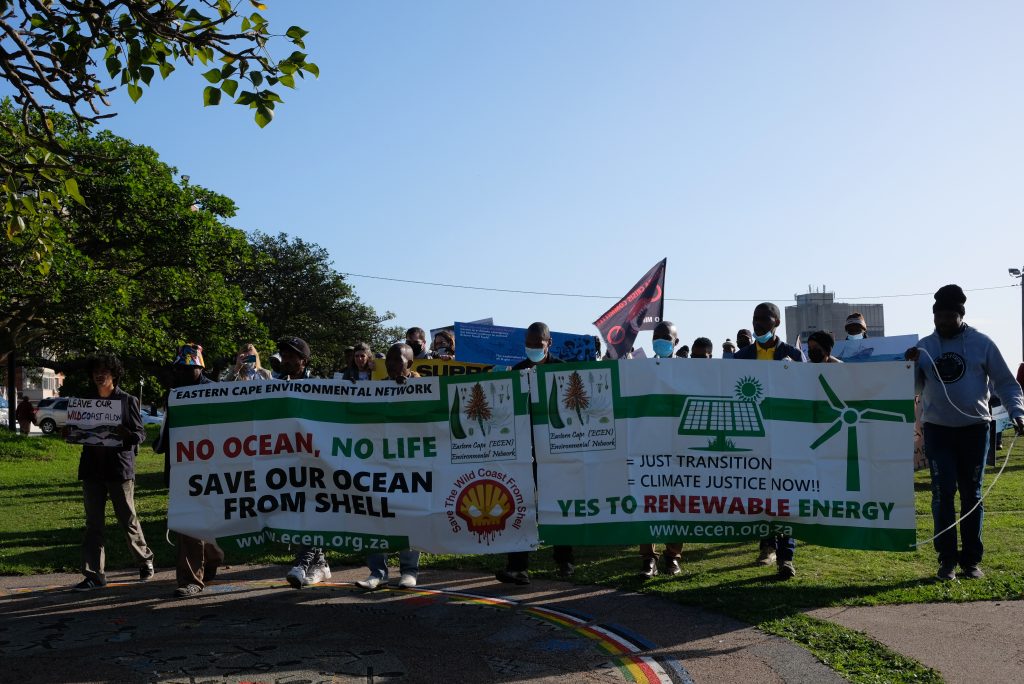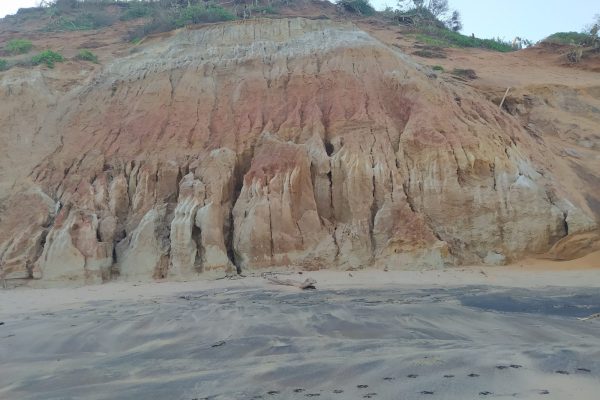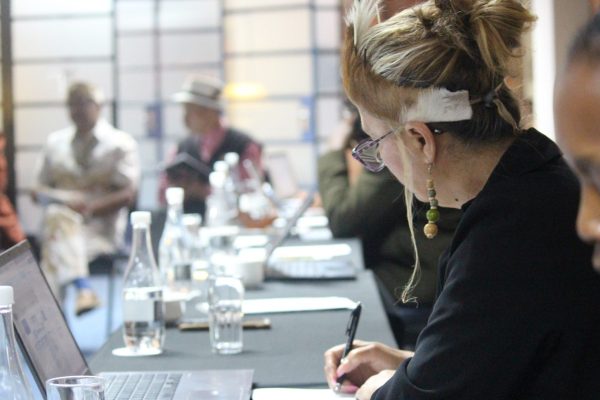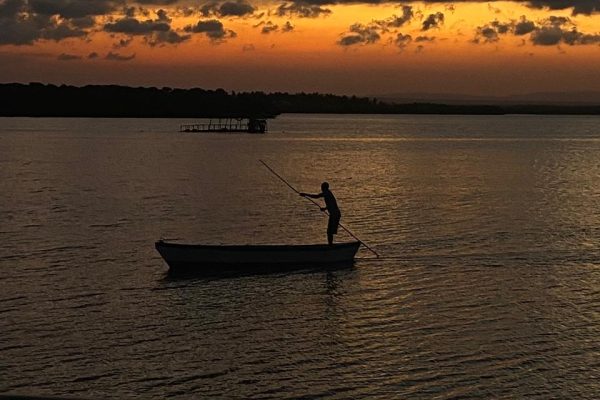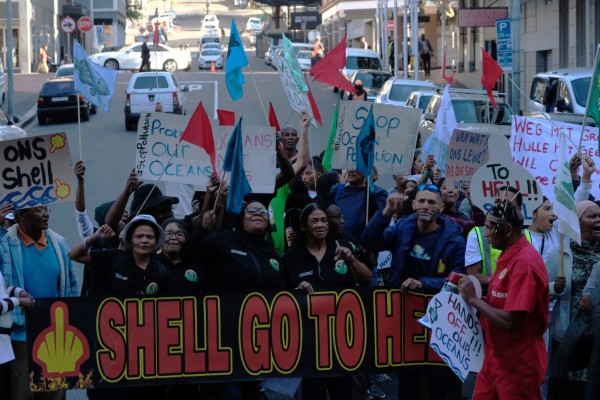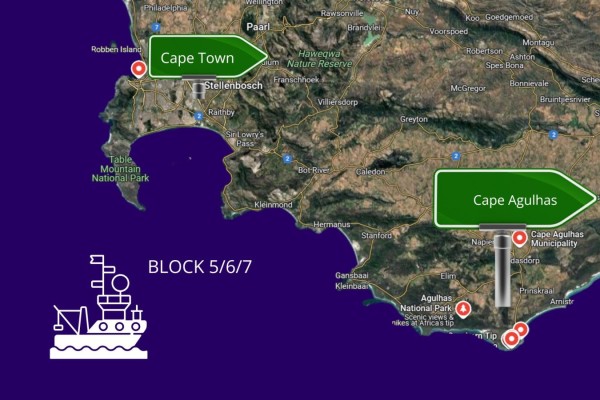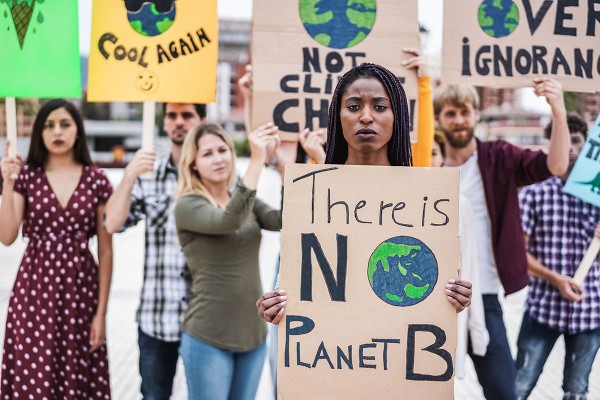31 May 2022, Gqeberha, South Africa: On the second and final day of the legal challenge against Shell and Impact Africa, the Gqeberha High Court heard respondents’ arguments following yesterday’s arguments from the 1st- 9th Applicants shared by Advocate Tembeka Ngcukaitobi SC and Advocate Nick Ferreira. The justices adjourned the matter, reserving judgment to both granting the joinder application put forward by Natural Justice and Greenpeace Africa (represented by environmental law firm Cullinan & Associates) and to the declarator that Shell required an environmental authorisation under the National Environmental Management Act (NEMA), and if their exploration right was lawfully awarded by the Department of Mineral Resources and Energy (DMRE).
The court session resumed this morning with the full bench hearing arguments from Counsel representing Impact Africa; the Minister of the Department of Mineral Resources and Shell.
Various arguments were made attempting to undermine arguments for applying the precautionary principle, the evidence of irreversible harm caused by seismic blasting and oil and gas exploration in general, communities’ constitutional rights to meaningful consultation and the evidence of clear and present danger posed by climate change. However, none of these arguments change the Applicants’ case that Shell’s exploration right was granted unlawfully without meaningful consultation with communities; that an environmental authorisation is required, that the precautionary principle must be applied, and that key legislation has been ignored.
It was especially notable that Impact’s Counsel argued that the joinder applicants bring nothing new to the case, when on the contrary Advocate Ferreira raised key new issues with respect to the NEMA:ICMA; climate change considerations; procedural unfairness in that no interested and affected parties were ever notified of the decision to grant the Exploration Right; and statutory/regulatory interpretation. The respondents’ arguments disregard and ignore the deep harms that will be incurred in pursuit of profits.
Adv Ngcukaitobi SC eviscerated the argument from Minister Mantashe and the companies’ that they do not need an environmental authorisation. He explained how this is directly contradicted by the clear language of the relevant statutes. Adv Ngcukaitobi SC also dispensed with the companies’ arguments that merely placing notices in newspapers in English and Afrikaans satisfied the requirements of the law. He explained that the Constitutional Court has confirmed that the purpose of consultation is to make sure that those directly affected by a project have a voice in that project. And in this case not a single Wild Coast community was consulted despite their intimate relationship with their ancestral seas.
Justices adjourned the court saying they would take some time to consider judgment.
Members of the public and the media are invited to register for a post-hearing webinar hosted by the applicants and attorneys tomorrow, Wednesday, 1 June at 16:30 SAST to share our reflections and analysis of the two-day court case. Applicants are also calling on the public to donate here to fund a united legal front to advance a sustainable future.
Summary of arguments: 1st-5th respondents
Continuing from yesterday, Jeremy Gauntlett SC representing Impact Africa argued against the joinder application sought by Natural Justice and Greenpeace Africa, suggesting that the 8th and 9th applicants add nothing new to the case saying they decided to attach themselves like a “cuckoo in a nest.” Gauntlett argued that the applicants are using a legal “knobkierrie” via interdict to undermine the Minister’s authority to decide the matter, laying blame on imperfect legislation rather than the decision-maker. Gauntlett also argued that the precautionary principle does not apply to this case but that the relevant question is only whether the harm is serious and irreversible.
Representing the DMRE, Advocate Beyleveld SC argued that the notification published in a newspaper was adequate according to the MPRDA Regulations. Beyleveld argued that no consultative process can reach everybody, so the fact that the consultative process in question did not reach affected communities should not render the consultative process inadequate so long as the process met the basic listed requirements set forth in the regulations. Beyleveld argued that the applicants should have instead directly challenged the regulations themselves as inadequate. Finally, Beyleveld argued that applicants were required to first resort to internal remedies under the MPRDA before bringing a court application.
Advocate Friedman, on behalf of Shell, stated that an approved Environmental Management Program (EMPr) under the old Mineral and Petroleum Resources Development Act (MPRDA) regime is not only the equivalent of an approved EMPr under the One Environment System but that this EMPr is also the equivalent of an Environmental Authorisation (EA) under the One Environment System, and as such, Shell should not have been required to obtain an EA in order to commence seismic testing.
Advocate Friedman argued that all three impugned decisions suffer from inadequate exhaustion of internal remedies. He argued that the applicants have made a “virtue of their own delay” and have come to court to make “opportunistic” arguments instead of turning to DMRE for redress. With respect to public comments from Minister Mantashe, which Friedman conceded were “rather scathing of the applicants” and “something that would cause the applicants concern that he would be impartial”, Friedman argued that the applicants should have still undertaken an internal appeal to Minister Mantashe’s Department instead of filing an urgent application with the court.
Advocate Friedman argued that the only “fair” approach to evaluating consultation processes is to apply the regulations as written without engaging in a further “subjective” inquiry into the adequacy of the consultation process that took place. Advocate Friedman went on to dispute the fact that environmental harm will result from conducting seismic testing.
Applicants’ Rebuttals
In reply, Advocate Tembeka Ngcukaitobi SC, on behalf of applicants 1-7, highlighted the differences between an EA under NEMA and an EMPr under the MPRDA and argued that a plain reading of the laws and regulations undercuts the respondents’ “circular and untenable” argument that an EMPr under the MPRDA is the equivalent of an EA under NEMA.
In response to arguments that the applicants should have pursued internal remedies with the MPRDA, Advocate Ngcukaitobi highlighted the egregiousness of Minister Mantashe’s biased public commentary and the fact that an entity associated with Shell donated significant amounts of money to the ANC in late 2021: “Once it is clear that there is a reasonable apprehension of bias, which is where we are, no one can sensibly argue that there are available alternative measures.”
Advocate Ngcukaitobi refuted Shell’s claim that a tick-box exercise of those bare minimum requirements expressly stated in the regulations constitutes adequate consultation by referring to the Constitutional Court’s stated preference for a procedural fairness standard when assessing the adequacy of consultation under the MPRDA.
With respect to environmental harm, Advocate Ngcukaitobi stated to the judges, “Contrary to the suggestion you’ve heard over and over again, the experts tell the Court that harm is inevitable.” After reminding the Court that the impugned decisions ignore a whole body of information on harm to human and environmental rights that should have been taken into account, Advocate Ngukaitobi highlighted the applicants’ expert evidence on the high likelihood of serious harm and the inadequacy of the proposed mitigation measures – some findings with which even the respondents’ experts agree. As Advocate Ngcukaitobi stated, “If ever there was a case deserving of the precautionary principle, it is today’s case.”
Finally, in response to the judges’ questions on spiritual and cultural rights in the context of sustainable development, Advocate Ngcukaitobi reiterated that such balancing of interests is a matter of inclusion, and that no such balancing is possible unless community members like the applicants are properly consulted.
Advocate Nick Ferreira, responding on behalf of Applicants 8 and 9, reminded the Court that an EA is a legal requirement that is independent of an exploration right and that an EA is required in order to undertake any listed activity under NEMA. As such, the validity of the exploration right is separate from the requirement for an EA, and Shell needed an EA prior to conducting a seismic survey, which is a listed activity under NEMA. Further, though the Minister has the power to deem an EMPr under the MPRDA to be an EA under NEMA, the Minister has not actually exercised this power in this case. Instead, as Advocate Ferreira described, Shell is trying to engage in a “ventriloquist dummy trick for the Minister” to say that the Minister has deemed their EMPr an EA under NEMA, but the Minister has not in fact made any such determination in this case.
In response to arguments that the applicants should have pursued internal remedies with DMRE, Advocate Ferreira reminded the Court that the intervening applicants requested copies of the decisions and corresponding reasons from DMRE and DFFE but received no response – preventing them from pursuing internal remedies with the Department.
Finally, Advocate Ferreira reminded the Court of the applicability of the NEM:ICMA, decision makers’ failures to consider this consequential legislation, and the failure of the respondents to address these ICMA arguments in any meaningful way, stating: “I said at the beginning of my main address that this was the slam dunk ground of review and nothing I’ve heard has persuaded me that it’s anything different.”
Quotes from attorneys and applicants
“Advocate Ngcukaitobi told the court that Shell and Impact marginalised the very people who live by and of the ocean that they want to blast by the manner in which it conducted participation. It is now asking the court to further the marginalisation by sending them back to Minister Mantashe to do an internal appeal before coming back to court,” Wilmien Wicomb, Attorney, Legal Resources Centre.
“We are living through a climate emergency, and we simply cannot allow the fossil fuel industry to circumvent the law to grow their profits, while the destructive impacts are externalised upon communities and the environment- now and in the future,” Melissa Groenink-Groves, Attorney, Natural Justice.
“The era of free-for-all oil and gas exploration has come to an end. This case marks the beginning of intense public scrutiny of all activity that exacerbates climate change and accelerates climate induced crises that communities in the global south are already facing, ” Ricky Stone, Attorney, Cullinan & Associates Inc.
“Shell and Impact’s arguments are eurocentric. If we found oil or gas, or valuable minerals under the Vatican or St Patrick Cathedral would we destroy those cultural buildings in the name of economic development? The people of the Eastern Cape, not only rely on their coastline for livelihoods and sustenance, but also revere their ocean for healing, heritage, faith and tradition,” Lucien Limacher, Head of Litigation, Natural Justice.
“After listening to the respondents’ arguments, what’s most concerning is how the rights of local coastal communities are deemed insignificant by the government, Impact Africa and Shell. Coastal communities, whose livelihoods and survival are dependent on the ocean, are simply ignored, their rights disregarded,” Sinegugu Zukulu, Sustaining the Wild Coast.
“They ask us where the proof is, but our proof is meaningless to them. They can’t run away from climate change, global warming is already impacting us. Our arguments are also about inclusion, their case is about us, but without us- we were excluded from the beginning, ” Nonhle Mbuthuma, Amadiba Crisis Committee.
“Greenpeace Africa’s demands are clear: Shell must not be allowed to destroy the Wild Coast. The voices of affected communities echoed through the court today and serve as a reminder that people must always come before profit. We remain hopeful for a favourable outcome, which will see Shell unable to destroy the Wild Coast,” Thandile Chinyavanhu, Greenpeace Africa, Climate and Energy Campaigner.
Ends
Notes to editor:
- Register here to join a post-hearing webinar with attorneys and applicants tomorrow at 16:30, Wednesday 1 June.
- Read previous press release; Day 1 press release & fact sheet
- The founding affidavits and supplementary affidavits can be found on our website
- Donate here to fund a united legal front and strengthen the global movement to transition away from fossil fuels and advance a sustainable future.
- Counsel:
- Counsel for Applicants 1-7: Tembeka Ngcukaitobi SC; Emma Webber; Nikki Stein. Instructing Attorneys: Legal Resources Centre and Richard Spoor Inc.
- Counsel for Applicants 8-9: Nick Ferreira and Cingashe Tabata. Instructing Attorneys: Cullinan & Associates Inc.
- Counsel for the Minister of the Department of Mineral Resources: Albert Beyleveld SC and Avian Barnett. Instructing Attorneys: State Attorney.
- Counsel for the Minister of the Department of Forestry, Fisheries and the Environment: Jennifer Williams. Instructing Attorneys: State Attorney.
- Counsel for Shell: Adrian Friedman and Sarah Pudifin-Jones. Instructing Attorneys: Shepstone & Wylie Inc.
- Counsel for Impact Africa: Jeremy Gauntlett SC QC; Frank Pelser; Adiel Nacerodien; Nikiwe Nyathi. Instructing Attorneys: Cliffe Dekker Hofmeyr Inc.
- Applicants and respondents:
- SUSTAINING THE WILD COAST NPC First applicant
- MASHONA WETU DLAMINI Second applicant
- DWESA-CWEBE COMMUNAL PROPERTY ASSOCIATION Third applicant
- NTSINDISO NONGCAVU Fourth applicant
- SAZISE MAXWELL PEKAYO Fifth applicant
- CAMERON THORPE Sixth applicant
- ALL RISE ATTORNEYS FOR CLIMATE AND THE ENVIRONMENT NPC Seventh applicant
- NATURAL JUSTICE Eighth applicant
- GREENPEACE ENVIRONMENTAL ORGANISATION Ninth applicant
- MINISTER OF MINERAL RESOURCES AND ENERGY First respondent
- MINISTER OF ENVIRONMENT, FORESTRY AND FISHERIES Second respondent
- SHELL EXPLORATION AND PRODUCTION SOUTH AFRICA BV Third respondent
- IMPACT AFRICA LIMITED Fourth respondent
- BG INTERNATIONAL LIMITED Fifth respondent
For media enquiries contact:
- Katherine Robinson, Natural Justice, katherine@naturaljustice.org +27 762 276 517
- Claire Martens, Natural Justice, claire@naturaljustice.org +27 82 470 1187
- Chris Vlavianos, Greenpeace Africa, cvlavian@greenpeace.org +27 798 837 036
- Annette Gibbs, Cullinan & Associates, annette@gibbsmedia.co.za +27 82 467 1295
- Nonhle Mbuthuma, Amadiba Crisis Committee, nonhlembuthuma@gmail.com +27 76 359 2982
- Sinegugu Zukulu, Sustaining the Wild Coast, zukulusinegugu@gmail.com +27 72 428 5109

